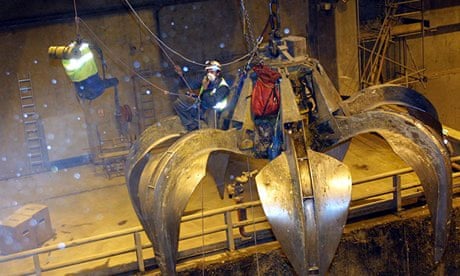Almost half of London's 33 London councils recorded a fall in the proportion of household waste they recycled in 2012-13 compared with the previous year, with a further five boroughs flatlining.
Annual waste statistics from the department for environment and rural affairs also revealed that more than 40% of waste was incinerated, an increase of 17 percentage points over two years. Over the previous decade it hovered just over the 20% mark.
Sadly, this is not surprising as the much-needed recycling and composting infrastructure such as anaerobic digestion, the natural breakdown of organic materials, for dealing with food waste has not come on stream fast enough. This is despite nominal backing from the previous mayor of London and the current mayor, whose revised strategy identified it as the optimal treatment method for food waste, after waste reduction.
With landfill taxes costing Londoner's about £300m and the much lower costs of recycling particularly with segregated collection compared to incineration, it is surprising that some local and waste authorities are still opting for this quick-fix option.
The downsides are numerous. Valuable natural resources that could be recycled are incinerated and more desirable waste technologies blocked.
London's average recycling rate of only 34% of its household waste is dire and keeps us firmly rooted as the worst region in England. This discredits the commendable work of the London boroughs, which have gone to great expense and efforts to improve this, with at least 10 achieving over 40% and Bexley top with 54%.
How Boris Johnson, the city's mayor, expects to exceed his London plan recycling target of 45% by 2015 is anyone's guess as a significant number of boroughs continue to lag behind and his target slips further away from his grasp. Under his administration (since 2008), London's recycling rate has improved by only 5%.
Hammersmith & Fulham and Kensington & Chelsea recorded unprecedented reductions of 7%, followed by Lambeth and Wandsworth with 5% reductions.
The proportion of London's household waste incinerated in 2012-13 was 40.9%, an increase of more than five percentage points on the 35.7 recorded in 2011-12. This is on top of the 12% increase the year before. These two years represent the fastest increases since annual data started to be published 13 years ago.
The mayor's waste arm, the London waste and recycling board, set up in 2008 and originally chaired by Johnson, has since been chaired by one of his representatives. While it has helped to deliver a number of new and desperately needed waste facilities, its business plan clearly acknowledges that London is facing a serious waste treatment capacity shortfall. By 2015, the city will be facing a shortfall of more than 4m tonnes, increasing to 8m by 2030.
There is only one operational anaerobic digestor plant in London. The mayor and his waste board must put far greater resources behind this technology, which turns food waste into biogas for generating heat and electricity, or into bio-methane for injection into the national gas grid or conversion into transport fuel, and rich fertiliser for garden and agricultural use.
I have consistently argued that only genuine "residual waste" – the element that cannot be recycled or composted – should be considered for energy generation. This should be no more than 30% of household waste. The Scottish government and Welsh assembly are well on the way to reaching 70% recycling rates.
Unless this growing waste crisis is dealt with intelligently and with effective leadership from our mayor, the preferred waste treatment options outlined in his waste strategy and London plan will continue to remain as mere policy and speech aspirations, as modern-day incinerators fill this void and come to dominate London's waste landscape for the next two or three decades.
Jenny Jones is a Green party member of the London Assembly.
View from Ealing

In Ealing a lot of progress has been made since 2007 when we transformed how we collected waste following out largest ever public consultation. By 2010 we had doubled Ealing's recycling rate. But the challenge remains as to how we push on from plateauing percentages in the low 40s.
I am working on a campaign to persuade residents to recycle more with the target of reaching a recycling rate of 50% by 2020. We are going to be using unusual and innovative approaches to encourage recycling.
Part of the approach will be launching a residents' rewards scheme, which will incentivise people to recycle. Participants will get points for the amount that they recycled, which they can then use to claim local discounts in shops or donate them to a community project.
Keith Townsend is executive director of environment and customer services at Ealing council.
Want your say? Email sarah.marsh@theguardian.com to suggest contributions to the network
Not already a member? Join us now for more comment, analysis and the latest job opportunities in local government.

Comments (…)
Sign in or create your Guardian account to join the discussion